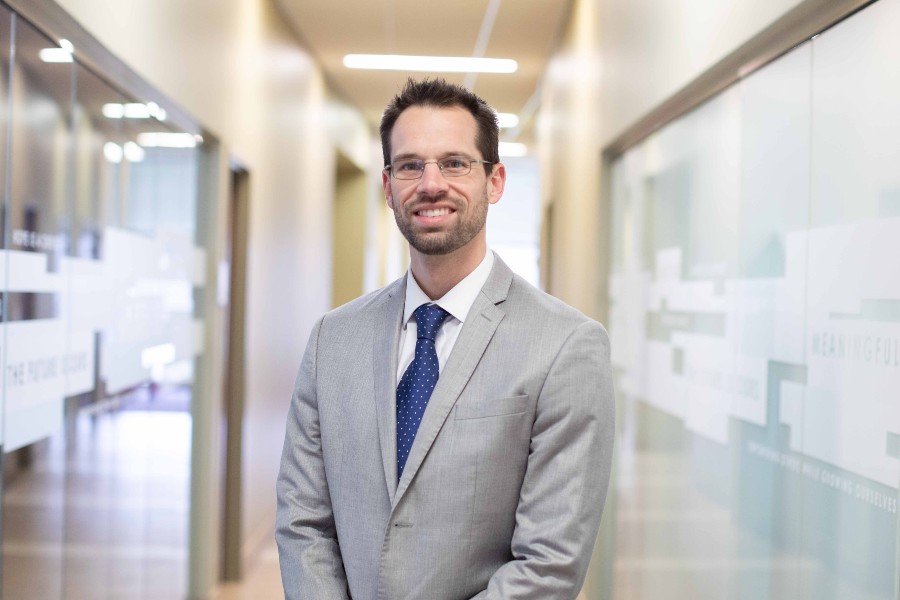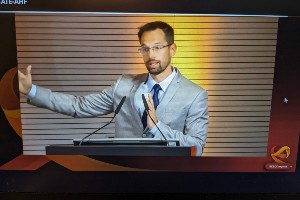Pharmacy professor presents research findings to the world
Zac Cox presents results of heart failure drug trial at European Society of Cardiology, largest cardiology congress in the world.
Janel Shoun-Smith |

Interested in joining Cox’s collaborations to magnify the power of new treatments for acute heart failure? Contact zac.cox [at] lipscomb.edu (subject: Interested%20in%20Partnering%20in%20Research) (Zac Cox) to become involved.
On Sunday, Aug. 27, Lipscomb University made its first appearance at the largest cardiology congress in the world, the European Society of Cardiology (ESC) Congress held in Amsterdam.
Dr. Zachary Cox, Lipscomb professor of pharmacy and inpatient clinical pharmacist at Vanderbilt University Medical Center, presented the results of his latest clinical drug trial at one of only nine special “hotline” sessions at an annual gathering of more than 30,000 active participants, mainly cardiologists.
The results of Cox’s $1.8 million DICTATE-AHF trial, funded by AstraZeneca, “have the potential to impact patient care on an international level by demonstrating the efficacy and safety of the drug dapagliflozin in acute heart failure,” said Cox.
The “practice-changing” significance of Cox’s trial results are underscored by the fact that pharmacists have rarely been selected to present at the ECS Congress. In addition, the “hotline” sessions are generally reserved for late-breaking news of recently completed trials with results worthy of sharing with the world. The hotlines are generally the largest and the most well-attended sessions, presenting the most cutting edge information, Cox said.
Since coming to Lipscomb, Cox’s main focus of research has been exploring various drug therapies to reduce diuretic resistance (the build-up of fluid and sodium in the body) in hospitalized acute heart failure patients. His research goes in tandem with his work at Vanderbilt on an interprofessional medical team that cares for patients but also teaches student pharmacists and medical students at the hospital. Cox works with physicians, case managers and nurses to formulate the medical therapy for heart failure patients.
Starting in 2020, Cox was the co-investigator of the DICTATE-AHF trial along with Vanderbilt’s Dr. JoAnn Lindenfeld. The multi-center study titled, “A Randomized, Open-label Study of Dapagliflozin in Patients with or without Type 2 Diabetes Admitted with Acute Heart Failure,” studied use of dapagliflozin, previously only used for diabetes, in acute heart failure patients. The drug is known to be beneficial for patients with chronic heart failure, but this study asked if it would be 1.) beneficial and 2.) safe to use immediately upon hospitalization for patients diagnosed with acute heart failure.
According to Cox’ presentation at ESC, “exploratory analyses indicated that dapagliflozin improved cardiac decongestion and led to earlier hospital discharge,” and “early dapagliflozin initiation did not worsen any pre-specified safety outcomes, indicating dapagliflozin can be safely started upon hospital admission to rapidly optimize guideline directed medical therapy (GDMT).”
“This study is important in that it can embolden physicians to safely initiate key medication early in the hospital stay and then continue that chronically for patients with heart failure,” said Cox at the Sunday press conference after his ESC Congress presentation.
“In terms of U.S. practice patterns, 80% of candidates who are not discharged on a SGLT2 inhibitor [a type of drug including dapagliflozin] come from a U.S. group of patients that were studied. So despite the evidence, despite the messaging, we still see that there is a hesitancy or some other factor that is limiting these therapies being prescribed to patients both early and prior to discharge from the hospital. So more and more evidence that can demonstrate safety, we think, hopefully, will improve” adoption in clinical practice, he told reporters.
LEARN MORE: See the ESC release of the DICTATE-AHF trial results here.

Cox's presentation, as seen here, was part of the ESC Congress' series of "hotline" sessions, generally the largest and the most well-attended sessions, presenting the most cutting edge information.
About Zac Cox
During his time at Lipscomb, Cox has garnered national and international attention for his research exploring various drug therapies for hospitalized heart failure patients. In May 2019, Cox was invited to present his research on “Diuretic Strategies for Loop Diuretic Resistance in Acute Heart Failure: The 3T Trial,” at the ESC Congress in Athens, Greece.
In addition, he is published in the Journal of the American College of Cardiology: Heart Failure with “Diuretic Strategies for Loop Diuretic Resistance in Acute Heart Failure: The 3T trial” and in the Journal of the American College of Cardiology as a co-author of a review of diuretics in heart failure. These journals are the top journals for heart failure research in the world, Cox said.
Cox has worked with Yale University’s Dr. Jeff Testani on 13 published articles exploring various drug therapies for acute heart failure patients, and these works have been referenced in the ESC’s and the American College of Cardiology’s international guidelines for heart failure treatment.
His published research includes “Compensatory post-diuretic renal sodium reabsorption is not a dominant mechanism of diuretic resistance in acute heart failure,” in the European Heart Journal in 2021, and he co-authored a book chapter in Cardiorenal Syndrome in Heart Failure on best practices for overcoming diuretic resistance.
In 2022, he started work on a five-year, NIH-funded trial at Vanderbilt and the Nashville Veterans Association to monitor and dose diuretics in hospitalized patients with heart failure.

Cox answers question at the press conference, streamed around the globe, after his presentation.
In addition, he has pioneered the inhaled form of the drug milrinone, of which he is co-inventor and co-principal investigator with Dr. Nick Haglund. Milrinone is normally administered through IV, so creating an inhaled form of the drug reduces the risk of infection and increases the quality of life for patients, who often have to take the drug by IV at home, while waiting for a heart transplant.
His work surrounding the need for the alternative delivery methods of this drug was praised by Cleveland Clinic cardiologists in an editorial entitled, “Implications of Central Venous Catheters in Patients with Stage D Heart Failure Who are Stable but Inotrope Dependent” in the Journal of Cardiac Failure. Other research findings by Cox have been praised by Duke University cardiologists.
Such national recognition provides Cox new opportunities to share the best practices around the world and builds the scientific community’s respect in Lipscomb’s research, thus boosting the chance of future grants and publications, Cox said.
“Everything that we are doing in these investigations is novel,” said Cox. “We know that one-third of patients who leave the hospital are not fully decongested. One reason is that they are resistant to the class of medications that we use. The risk of that patient dying in the next year is really high. So we are demonstrating that different classes of medications can help with the decongestion and thus produce less chance of death in chronic heart failure patients.”
Student-focused teaching
Many of Lipscomb’s fourth-year student pharmacists in its College of Pharmacy, carry out their advanced pharmacy practice experiences (APPEs) at Vanderbilt, working directly under Cox. Through his university appointment, Cox is able to keep up on the latest drug research and to apply it to both patient care and teaching at the hospital.
“Research and practice serve to make each other better,” Cox said. “Treating patients helps me develop better research questions that are directly applicable to patient care. Then the research conclusions help us care for the patients better.
“Plus students ask such good questions,” Cox said. “They certainly hold you accountable and keep you working at your best.”